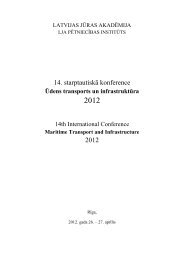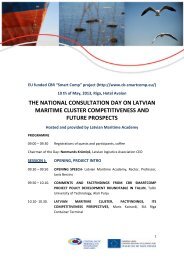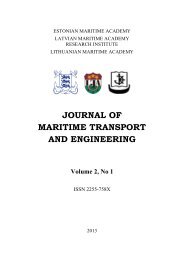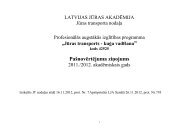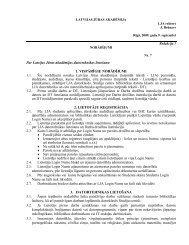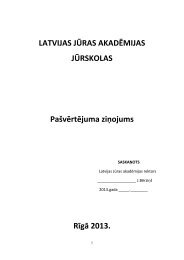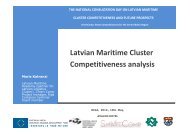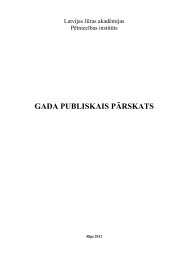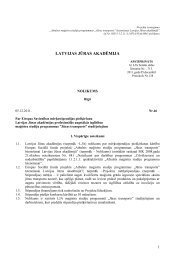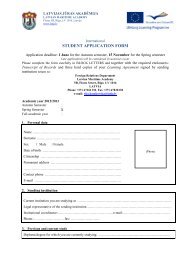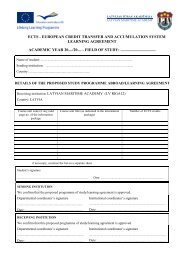Latvian Maritime academy
Latvian Maritime academy
Latvian Maritime academy
Create successful ePaper yourself
Turn your PDF publications into a flip-book with our unique Google optimized e-Paper software.
Word borrowing may, like other ways of augmenting the vocabulary, be motivated by the need for<br />
adequate denotation of new cognitive contents or concepts arising in the process of the material and<br />
spiritual development of society [5]. English borrowed an immense number of words from the French of<br />
the Norman invaders. And so the process has continued uninterruptedly down to the present day, each<br />
cultural wave bringing to the language a new deposit of loan-words.<br />
When in two languages we find no trace of the exchange of loanwords one way or the other, we are<br />
safe to conclude that these two nations have had nothing to do with each other. But if they have been in<br />
contact, the number of loan words will inform us of their reciprocal relations, the influence they have had<br />
on each other and in what domains of human activity each has been superior to the other. The study of<br />
language proves the fact that when one nation produces something that its neighbours think worthy of<br />
imitation they will take over not only the thing, but also the name. Loan words are nearly always<br />
technical words belonging to one special branch of knowledge or industry, and may be grouped so as to<br />
show what each nation has learnt from the other [6].<br />
The Influence of Latin on English<br />
Much of the vocabulary of formal English is of Latin origin. In contrast, informal language is<br />
characterised by vocabulary of Anglo-Saxon origin e.g. commence, continue, conclude {formal}; begin,<br />
keep up, end {less formal}. Formality can be applied to aspects of the situation in which communication<br />
takes place and to the features of language which correlate with those aspects [7].<br />
Latin has since the earliest period of the history of English been one of the principal donor<br />
languages in the expansion of the English vocabulary. A great many of the lexical items which can<br />
ultimately be traced back to Latin have entered the English language indirectly via French and various<br />
other Romance languages, which together with Latin probably contributed almost two thirds of the word<br />
stock of present day English.<br />
A substantial part of Latin and Greek loans which have survived to the present day were first<br />
introduced as particular terms in science e.g. theory (Gr), praxis (Gr), system (Gr), method (Gr),<br />
atmosphere (Gr),radius (L), formula (L), calculus (L), notion (L), concept(L), satellite(L), exist(L), etc.<br />
[1] Sometimes quite a number of English words come from just one Latin root. For example, the Latin<br />
word vocare, vocatus vocare - to call; vocatus – called - has produced a whole range of words in English<br />
vocabulary e.g. provoke, provocative, evoke, evocative, convoke, convocation, vocation, avocation, voice,<br />
vocal, revoke, revocation, revocable, irrevocable, convocator, advocate, advocate, advocation,<br />
provocation, etc. [1]<br />
Prefixes and Suffixes of Foreign Origin<br />
The contact of English with various foreign languages has led to the adoption of countless foreign<br />
words. In the process, many derivative morphemes have also been introduced, suffixes as well as<br />
prefixes. As a consequence, there are many hybrid types of compounds in English. The majority of<br />
foreign suffixes owe their existence to the reinterpretation of loans. When a word of foreign extraction<br />
comes to be analysed as a compound, it may acquire derivative force. From landscape (which is Du<br />
landschap) resulted scape which is almost entirely used as the second element in compounds, as in<br />
seascape, moonscape, skyscape, waterscape, etc. [1]<br />
Prefixes of foreign origin came into the English language ready made, due to syntagmatic loans<br />
from other languages: when a number of analysable foreign words of the same structure had been<br />
introduced into the language, the pattern could be extended to new formations [8].<br />
There are many prefixes, chiefly used in learned words or in scientific terminology, which have<br />
come into the language through borrowing from Modern Latin, as ante-, extra-, intra-, meta-, para-, etc.<br />
A limited number of Latin prepositions can help build hundreds of new vocabulary words The Latin<br />
prefix ab- means away from [1]. It connotes motion from, and occurs in English words such as absent,<br />
abstract, abstemious and abhorrent. On the contrary, ad- means to or toward with.<br />
A basic knowledge of suffixes can increase vocabulary for the student of English. An understanding<br />
of just one common ending can have a significant effect on student performance in reading and writing,<br />
e.g. Latin –fy to make or to become. The older English verbs in –fy are adoptions of French verbs in –fier,<br />
which are either adapted from Latin verbs or formed on the analogy of verbs [1]. To magnify is to make<br />
bigger. To reify is to make into a king. To fortify is to make stronger. To pacify is to make peace. To edify<br />
means to make or convert into something [1].<br />
38



